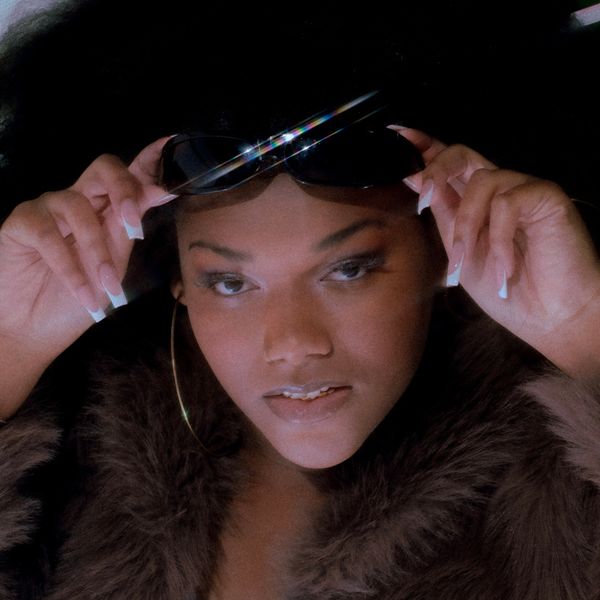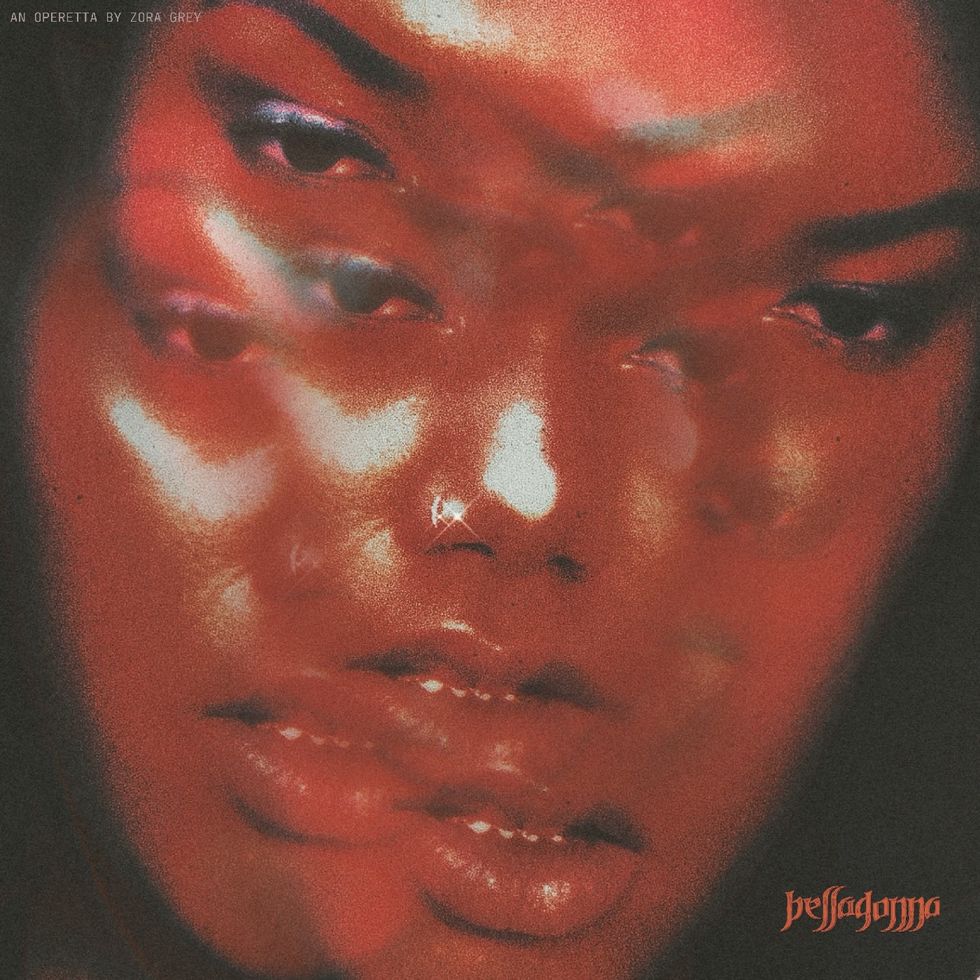
ZORA's Act of Resistance
By Justin Moran
Feb 10, 2025ZORA’s voice is needed now more than ever — and on her sophomore album BELLAdonna (via Get Better Records), the Minneapolis transgender artist has taken hold of the mic.
A follow-up to her 2022 breakout Z1, ZORA's latest LP was also self-produced and self-written, developed over the course of seven years in her bedroom in response to traumatic experiences with exploitation and abuse. “This album goes into a lot of details about myself,” Zora says, knocking open the story of her life and facing her past head-on.
Belladonna, the titular character and title, became something of a supernatural alter ego for ZORA to step into throughout this concept album, as she seeks revenge on women who’ve also been harmed. Divided into two discs, Belladonna’s journey is one of “healing and love,” Zora explains, as she ultimately wanted her to find “peace and a kindred spirit” within this process. “While this album is dark, I want to also make sure it ends on a positive note,” she says.
The result is a “collective voice of resilience and empowerment,” as told through ZORA’s powerful voice. On BELLAdonna, she traverses the sounds of hip-hop and pop to create a "Black gothic horror" across 16 different tracks. Below, PAPER learns more about the album from ZORA, who considers it "an act of resistance."

This album is self-produced, which is so impressive and rare. What does the process look like for you, as far as creating beats and writing the material? Does one come first typically?
It really depends on what the vibe is for that specific song. There are certain songs that have started with me just humming a tune in the shower and making a beat over that. Other times, I’ve started by writing a couple chords, either on piano or guitar, and adapting that live sound into an electronic setting. It really just depends on how I’m feeling in that moment.
This album is being released in a time that's especially volatile for the trans community. How do you want it to exist in the world and be received by listeners?
For real, tell me about it. I would like this album to stand as an act of trans resistance — in a time where we are being silenced, told that we don’t even exist and violence is at an all time high. To me, this album is my way of saying, “I’m not letting you get away with that shit.” My community sees you, I see you and transsexualism will always triumph over bigotry — sorry.
Conceptually, what story did you intend to tell through this project from start to finish? Is there a difference between the two discs, thematically?
I wanted to tell the story of a somewhat flawed character that is so obsessed with blaming herself for everything, that she isn’t able to be present and acknowledge the community and home around her. I wanted to start the album by talking about very prevalent issues in the trans and larger LGBTQIA community — hidden love, bashing and bigotry. I wanted to tackle those issues in the first part very heavily and abrasively, so that the folks who listen don’t stay on a solemn note. I also wanted to make it very clear in the album that this is not trauma porn, but rather, simply, art and a way of telling my story.
Is there a track on this project that you feel best reflects you as an artist, right now?
“Tinytown” is the song on the album that has really been resonating with me. Lately, I’ve felt a bit lost and I feel like now I’m just starting to find myself again. “Tinytown” is a song that’s meant to display that fear of the unknown — an inescapable, looming feeling that you couldn’t possibly know everything there is to know. That really haunts me. I wish I knew everything.
I read that you've been working on this since 2017. Talk us through that period of time and the growth you've experienced as a person and artist. How did that extended timeline impact the music?
When I started working on the album, I was a lot less secure in where I was in life. I was an 18-year-old and I had freshly dropped out of school, for the first time. As I’ve aged, my music has aged with me, and I’ve been able to add such amazing production elements and cool, cute sounds into songs that I’ve been working on for so long. Lyrically, changing certain lyrics so that they resonate with who I am today feels very healing.
In what ways do you connect to the alter ego you've created on this album? How are you innately different?
I relate to a lot of the character traits of Bella. She is a woman that does not shy away from how she feels and she is almost comically honest about certain things that she’s experienced. But it’s that raw, pure anger that lives within her that I can resonate with. Creating an alter ego is a great way to address what’s going on in the world right now, in an artistic way. I think we are innately different, most prominently, in the sense that I don’t put myself into fucked up situations — at least, not anymore. And that’s something that is, unfortunately, Bella’s crutch.
There's a real pop sensibility to some of these tracks, but they still feel rebellious. Do you consider that balance and, if so, how do you strike it?
I definitely do try to add rebellion in whatever I make. It’s hard for me not to, to be honest. I am a music lover — I love hip-hop, pop, house and so many other genres. My main mission is to tie the lyrics that I’d prefer to write — typically political — into a song or body of work that fits into those genres. It’s something that could come on at the club and you could be dancing to it, but if you listen to what I’m really saying, it’ll make you stop in your tracks.
I grew up in Minneapolis. What about that city — the sounds, the community, the vibes — helped to inspire this release?
I love Minneapolis. The queer community here, in general, has really inspired and motivated me to continue making art. I have a lot of love for the ballroom scene here, as well as the trans-femme techno scene. I’ve always preferred to go to a club where everybody’s super sweaty and dancing their asses off.
Why do you think it’s important to continue creating and supporting queer art in 2025? What is the best way for people to do that?
It is extremely needed, especially right now. To be honest, I’m always scared now, to go outside, to write music, to post on social media. Everything is scary because you don’t know what could happen next. But that keeps me going. It is scary right now — they want you to shut up about it, they want trans people to just shut up and take it. And I’m not going to do that nor are any of my trans siblings. Art, for me, is a way to continue to express myself and I consider it an act of resistance.
Art, for me, is a way to continue to express myself and I consider it an act of resistance.
Photos courtesy of William Hawk
Related Articles Around the Web
MORE ON PAPER
Cardi B sorprende con una presentación inesperada y deja a todos “Ready Pa’l Show”
Español
Feb 14, 2026
ATF Story
Madison Beer, Her Way
Photography by Davis Bates / Story by Alaska Riley
Photography by Davis Bates / Story by Alaska Riley
16 January
Entertainment
Cynthia Erivo in Full Bloom
Photography by David LaChapelle / Story by Joan Summers / Styling by Jason Bolden / Makeup by Joanna Simkim / Nails by Shea Osei
Photography by David LaChapelle / Story by Joan Summers / Styling by Jason Bolden / Makeup by Joanna Simkim / Nails by Shea Osei
01 December
Entertainment
Rami Malek Is Certifiably Unserious
Story by Joan Summers / Photography by Adam Powell
Story by Joan Summers / Photography by Adam Powell
14 November
Music
Janelle Monáe, HalloQueen
Story by Ivan Guzman / Photography by Pol Kurucz/ Styling by Alexandra Mandelkorn/ Hair by Nikki Nelms/ Makeup by Sasha Glasser/ Nails by Juan Alvear/ Set design by Krystall Schott
Story by Ivan Guzman / Photography by Pol Kurucz/ Styling by Alexandra Mandelkorn/ Hair by Nikki Nelms/ Makeup by Sasha Glasser/ Nails by Juan Alvear/ Set design by Krystall Schott
27 October
Music
You Don’t Move Cardi B
Story by Erica Campbell / Photography by Jora Frantzis / Styling by Kollin Carter/ Hair by Tokyo Stylez/ Makeup by Erika LaPearl/ Nails by Coca Nguyen/ Set design by Allegra Peyton
Story by Erica Campbell / Photography by Jora Frantzis / Styling by Kollin Carter/ Hair by Tokyo Stylez/ Makeup by Erika LaPearl/ Nails by Coca Nguyen/ Set design by Allegra Peyton
14 October




